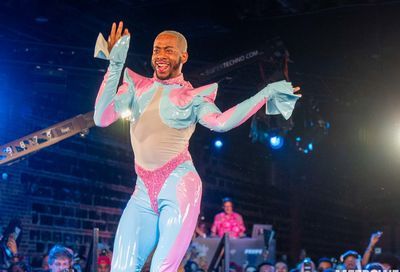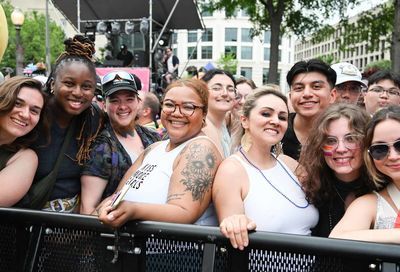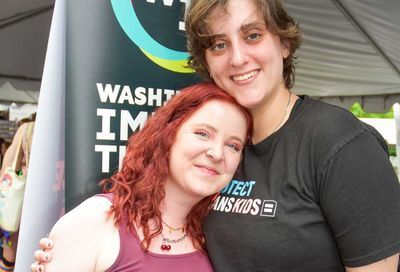Sudden Departure
Commentary: In Exile
Whenever my phone rings and I see my parents’ number in the little window, my first thought is always that my grandmother died. She’s very old and has Alzheimer’s, so that call is imminent. One of these days, my phone is going to ring, and it’ll be my mom or my dad calling to tell me that Grandma is dead. There’s no chance that this will not happen. With each call, I know the odds are a little bit higher.
If only life were so predictable. Two Fridays ago, I rolled out of bed and shuffled out to the living room to find Carl just wrapping up a phone call. His face was as flat as a dial tone. Carl’s hardly ever somber about anything, and I knew right away that someone had died. It turned out to be a friend of ours, Garrett, a 37-year-old documentary filmmaker.
The first thing most people do when they hear that someone they know has died is remember the last time they saw them. I’d last seen Garrett at a party on the Lower East Side a few months ago. The party was to celebrate the release of his latest film, Occupation: Dreamland, which premiered at Lincoln Center last fall. It’s a documentary about American soldiers in Iraq, which Garrett and his partner had made while embedded with a squad from the army’s 82nd Airborne in Falluja during the violent winter of 2004. The film was a great success. The Times ”critic-picked” it. The Village Voice gave it a glowing review. It was short-listed for an Oscar nomination and nominated for an Independent Spirit Award. The mood at the party was exuberant. Garrett seemed thrilled.
Carl got the call from Sam, a mutual friend of Garrett’s who teaches poetry in Boston, the day before the Independent Spirit Awards were to be announced. He filled Carl in on the details. Garrett had been visiting his family in San Diego. A former lifeguard, he’d had a heart attack while doing laps in a pool. The autopsy would later show that he had drowned.
We took the morning off from work and had breakfast at the café across the street. Carl told me a few things about Garrett that I didn’t know. He had known Garrett better than I did; they’d been friends for years before I’d even moved to New York. But even knowing a lot about him, nothing about Garrett’s death made any sense. He was a stressed out guy and he smoked cigarettes, but as far as we knew, his lifestyle wasn’t all that different from ours. And he’d just spent several months in the midst of a war zone — not something unhealthy people do.
The next day, the Independent Spirit Awards took place in Santa Monica. Garrett’s film won the Truer than Fiction award, presented to an emerging filmmaker who has not yet achieved wide recognition.
The day after that, a Sunday, some friends of Garrett’s got together at his apartment in Brooklyn. I wouldn’t call it a wake. If anything, it eventually took on a sort of party atmosphere. One of the soldiers from the movie was there. He’d since quit the army and was taking classes at Parsons. He cooked all sorts of food the whole night: chicken masala, arepas, hummus. It was kind of amazing. People drank a lot of wine. I learned from someone that Garrett was born in Munich. We also learned that he’d been diagnosed with a heart arrhythmia years earlier, which probably led to the heart attack. Someone had spread old snapshots of him out on a table. One of them was of him on the beach in his lifeguarding days, all tan and buff. Carl and I both admitted to each other that we thought he looked hot.
It was strange to see his apartment, which I had never been to before. It was located in a dicey section of East Williamsburg, a desolate factory district that had been abandoned in a sudden demographic shift. The loft had huge east-facing windows, which must have let in a blinding sheet of sunlight every morning. I pictured Garrett pouring over transcripts of interviews in the sunlight, closing the shades to edit video.
It’s strange to see a dead person’s stuff, their bed and their cookware and desktop computer, so soon after they’re gone. The alarm on his alarm clock was still set, and there was a carton of unexpired milk in the fridge. I wondered who would take care of moving his things out of the apartment, and where they would move them to, or if they’d just put an ad on Craigslist, pricing it all and selling it. The idea seemed both vulgar and practical. I realized that I have no idea about the logistics that go along with death. When you’re 27, it’s not a concern. I assumed Garrett’s parents wouldn’t handle it, nor should they have to. They must be fairly old, and they live so far away.
Carl is only three years younger than Garrett was, which I’m sure is quite weird for him. I certainly don’t think about death as it pertains to me or anyone else my age. I have one good friend who has HIV, and I don’t even think of him as sick. The call from mom or dad about grandma is the way I contextualize death. As if fate could be so well-scheduled.
Carl went to the funeral in San Diego the week after the gathering at Garrett’s apartment. He said it was a bit uncomfortable, as funerals are for those of us who aren’t used to attending them. When he came back, he showed me pictures of him and Sam faux-kung-fu fighting in their suits on a sidewalk. We talked about how weird California is. I remembered the one time I’d been to San Diego I got a ticket for jaywalking. We talked about his red-eye flight home, and about Garrett’s parents’ house, which was apparently once featured in House Beautiful magazine in the late ’80s. Then Carl went to sleep, I went to work, and that, strangely, was that.
Will Doig writes from his exile in New York City. He can be reached at wdoig@metroweekly.com.
Support Metro Weekly’s Journalism
These are challenging times for news organizations. And yet it’s crucial we stay active and provide vital resources and information to both our local readers and the world. So won’t you please take a moment and consider supporting Metro Weekly with a membership? For as little as $5 a month, you can help ensure Metro Weekly magazine and MetroWeekly.com remain free, viable resources as we provide the best, most diverse, culturally-resonant LGBTQ coverage in both the D.C. region and around the world. Memberships come with exclusive perks and discounts, your own personal digital delivery of each week’s magazine (and an archive), access to our Member's Lounge when it launches this fall, and exclusive members-only items like Metro Weekly Membership Mugs and Tote Bags! Check out all our membership levels here and please join us today!
























